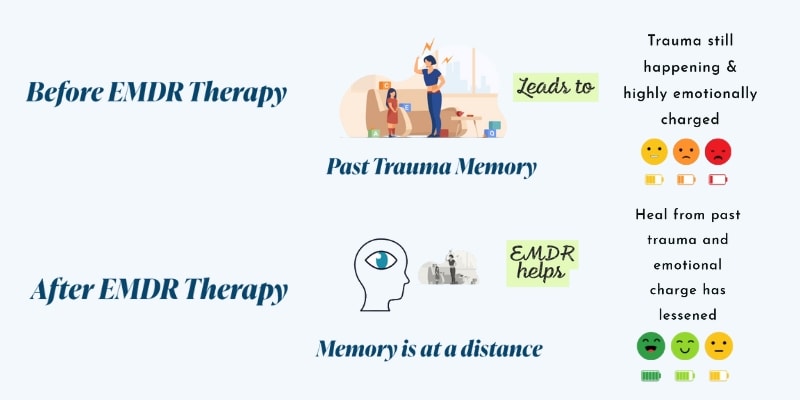
EMDR: Processing Traumatic Memories with Safety and Support
“Trauma creates changes you don’t choose. Healing creates changes you do.”
Eye Movement Desensitisation and Reprocessing (EMDR) is a proven therapy designed to help people work through traumatic memories in a safe and supportive way. At Insightful Counselling in Singapore, we use EMDR to reduce the emotional intensity of painful experiences, allowing you to process them without feeling overwhelmed. With compassionate guidance, EMDR therapy can help you move forward, regain control, and find relief from the impact of past trauma.
EMDR Therapy In Singapore
Bad Memories in the Present and Past Memories in the Past
EMDR is effective for most anxiety-based disorders like panic disorders, depression and many more
It is listed as a treatment for PTSD by World Health Organisation, American Psychiatric Association, American Psychological Association to name a few.
EMDR helps move away from Distressing life memories from the past and traumatic experiences.
EMDR therapy helps to work with neurological linkage in the brain to stop the fight, flight or freeze response
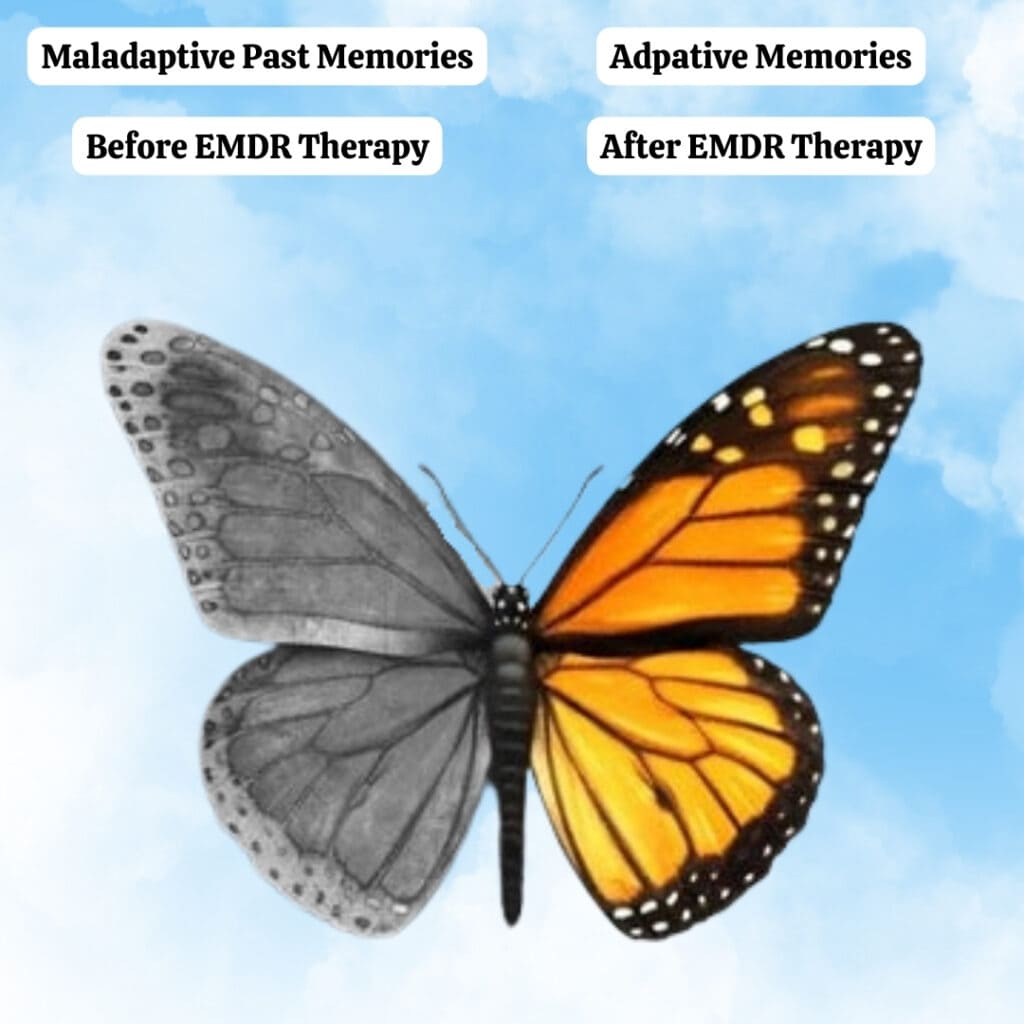
Eye Movement Desensitization and Reprocess therapy or as it is commonly called by its acronym EMDR, works with our past traumatic events. These events can trigger anxiety, depression, and stress. It helps the brain to relook at these painful experiences. These memories often contain negative beliefs, behaviour, emotions and somatic feelings. EMDR therapy helps to heal from these experiences. For example, our EMDR therapist helps you to shift from ‘I am helpless’ to ‘I can help myself’.
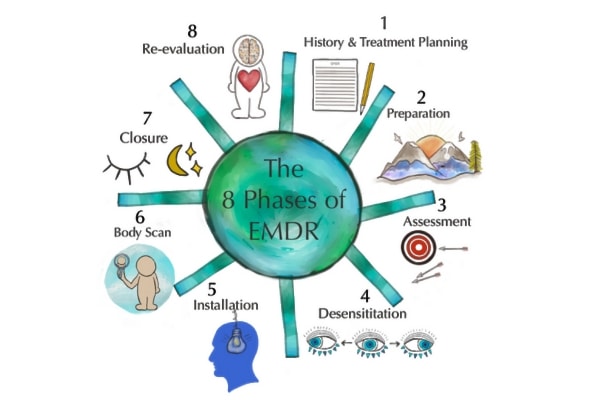
Eye Movement Desensitization and Reprocessing (EMDR) therapy involves a structured eight-phase approach to help individuals process distressing memories and overcome the adverse effects of trauma.
Here are the 8 phases of EMDR therapy sessions –
Phase 1: History-taking and Treatment Planning
In the first phase, the therapist gathers information about the client’s history, including their trauma and current symptoms of trauma. The therapist and client work together to identify specific target memories for processing.
Phase 2: Preparation
The therapist educates clients about the EMDR process and helps them develop coping mechanisms and relaxation techniques. Establishing a therapeutic relationship and ensuring the client feels safe is crucial in this phase.
Phase 3: Assessment
The therapist works with the client to identify negative beliefs and associated physical sensations related to the target memory. Additionally, positive beliefs are identified as targets for installation.
Phase 4: Desensitization
This phase involves bilateral stimulation (often through guided eye movements) while the client focuses on the target memory. The goal is to facilitate the processing of disturbing material and reduce its emotional charge.
Phase 5: Installation
Positive beliefs are strengthened and integrated during this phase. The client is asked to focus on positive thoughts, feelings, and sensations associated with the target memory while bilateral stimulation is applied.
Phase 6: Body Scan
The therapist and client explore the body to identify any residual tension or discomfort associated with the target memory. If such sensations exist, additional processing may be done to address them.
Phase 7: Closure
This phase ensures the client feels stable and can manage any residual emotions arising after a session. The therapist provides tools and resources for self-regulation.
Phase 8: Reevaluation
In subsequent sessions, the therapist and client reevaluate the progress and identify any remaining issues. Additional memories or aspects may be targeted if needed.
It’s important to note that while these phases provide a structured framework, the EMDR therapy process is highly individualized, and the number of sessions required can vary. Additionally, therapists may adapt the approach based on the client’s needs and the nature of the trauma being addressed.
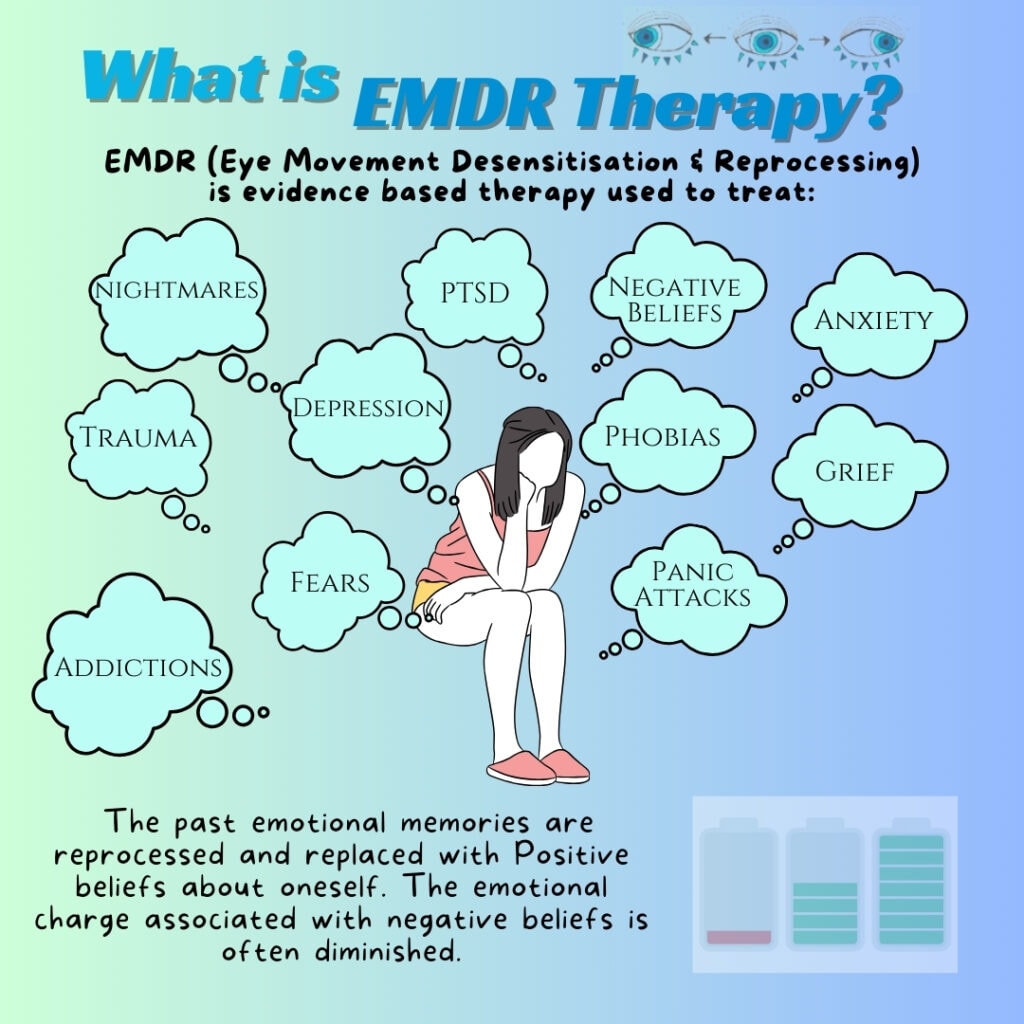
Eye Movement Desensitization and Reprocessing (EMDR) is a psychotherapy approach that was originally developed to treat post-traumatic stress disorder (PTSD). However, over time, it has been used to address a range of conditions and problems. If you or your loved one has an issue as mentioned below, it can help you process your triggers and move forward on a journey of healing and positivity-filled life. Some of the conditions and issues that EMDR may be used to treat include.
- PTSD
- Depression
- Anxiety Disorder
- Distressing Experience
- Sexual Abuse
- Childhood Trauma
- Negative Self-beliefs
- Physical Violence
- Emotional Abuse
- Panic Attack
- Phobias
- Grief and Loss
- Trauma
- Chronic Pain
Eye Movement Desensitization and Reprocessing (EMDR) therapy is a specialized form of psychotherapy that has been found to be particularly effective in treating individuals who have experienced trauma. Here are some of the benefits associated with EMDR therapy:
– Effective Treatment for Trauma and PTSD: EMDR therapy is widely recognized for its effectiveness in treating post-traumatic stress disorder (PTSD) and trauma-related issues. It has been endorsed by organizations such as the World Health Organization (WHO) and the American Psychological Association (APA) as a recommended treatment for trauma.
– Rapid Symptom Reduction: EMDR therapy is often praised for its ability to bring about relatively rapid symptom reduction compared to other forms of psychotherapy. Many individuals experience relief from distressing symptoms in a shorter time frame, though the specific duration can vary from person to person.
– Less Talk-Centric: EMDR therapy is unique because it doesn’t rely solely on traditional talk therapy. While clients discuss their experiences, the therapeutic process involves bilateral stimulation, typically in the form of guided eye movements. This can make it particularly appealing for individuals who find traditional talk therapy challenging.
– Memory Processing: EMDR is designed to help individuals process distressing memories more adaptively. The bilateral stimulation mimics the rapid eye movement (REM) sleep phase, during which the brain processes and integrates information. This processing can contribute to a reduction in the emotional charge associated with traumatic memories.
– Holistic Approach: EMDR therapy takes a holistic approach to treatment by addressing not only the symptoms but also the underlying beliefs and emotions associated with traumatic experiences. By reprocessing these memories, individuals may experience a shift in their overall perspective and emotional response.
– Applicability to Various Traumas: EMDR therapy has shown effectiveness in treating various types of traumas, including but not limited to single-incident traumas, complex traumas, and developmental traumas. It is a versatile approach that can adapt to different types of distressing experiences.
– Research Support: Numerous research studies support the effectiveness of EMDR therapy. While the precise mechanisms are not fully understood, the therapy has been shown to produce positive outcomes in controlled trials and clinical settings.
– Empowerment: EMDR therapy often focuses on helping individuals develop positive and adaptive beliefs about themselves. This empowerment aspect of the treatment can contribute to improved self-esteem and a greater sense of control over one’s life.
It’s important to note that while EMDR therapy has shown significant benefits for many individuals, not everyone responds to the same treatment in the same way. Individual experiences may vary, and qualified mental health professionals should discuss the appropriateness of EMDR.
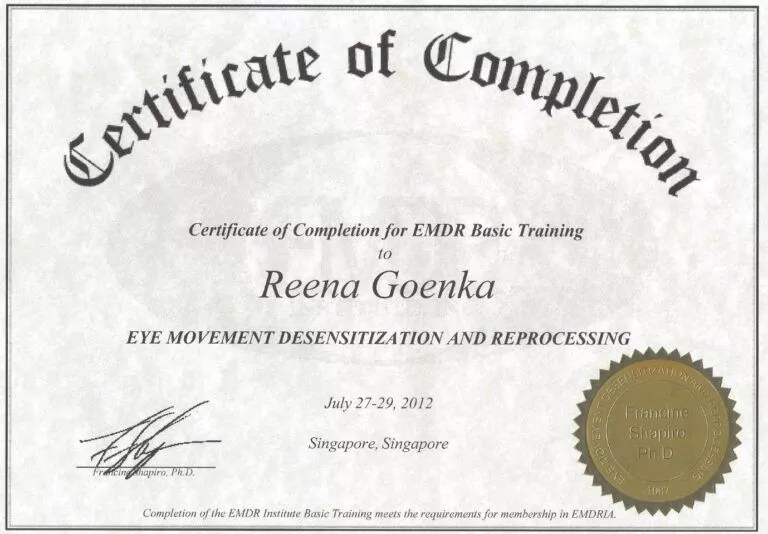
We at Insightful ensure we are committed to providing ethical services to our clients. Our therapist, Reena Goenka, is a certified EMDR therapist in Singapore. She is one of the few certified therapists for EMDR in Singapore. She is trained in EMDR therapy since 2011. She has worked with many clients to help them overcome their issues in fewer sessions than normal therapy will require.
You can check her credentials at https://www.emdria.org/directory/people/reena-goenka/
Our therapist Yap Huay Khem is also trained in EMDR therapy.
Choosing insightful counselling for your Eye Movement Desensitization and Reprocessing (EMDR) therapy involves considering several factors to ensure you receive effective and personalized treatment. Here are some reasons why insightful counselling may be a good choice for EMDR therapy:
– Experienced and Licensed Therapists:
Insightful counselling services typically employ licensed and experienced therapists with specialized training in EMDR. Ensure that the therapists are certified in EMDR and have experience working with individuals dealing with trauma.
– Individualized Treatment Plans:
Insightful counselling services often emphasize individualized treatment plans. This means that your therapist will tailor the EMDR process to your specific needs, taking into account your unique history, symptoms, and goals for therapy.
– Holistic Approach:
Insightful counselling may incorporate a holistic approach to therapy, considering not only the psychological aspects of trauma but also the physical and emotional dimensions. This can contribute to a more comprehensive healing process.
– Therapeutic Relationship:
A strong therapeutic relationship is crucial to the success of EMDR therapy. Insightful counselling services prioritize building a trusting and supportive relationship between the therapist and client, creating a safe space for the processing of traumatic memories.
– Collaborative and Transparent Communication:
Effective therapy involves open and transparent communication between the therapist and the client. Insightful counselling may emphasize collaborative decision-making, ensuring you are informed and actively engaged in the therapy process.
– Integrated Approaches:
Some counselling services integrate EMDR with other therapeutic modalities or techniques to address a broad range of issues. This integrated approach can enhance the effectiveness of the therapy, especially if there are co-occurring mental health concerns.
– Evidence-Based Practice:
Insightful counselling services that prioritize evidence-based practices, including EMDR, are more likely to provide treatments that have been researched and shown to be effective in addressing trauma and related symptoms.
– Supportive Environment:
A supportive and empathetic environment is crucial for successful trauma processing. Insightful counselling services often strive to create a warm, nurturing space that fosters healing.
When seeking EMDR therapy, it’s essential to research and interview potential therapists or counselling services to ensure they align with your preferences and needs. Look for professionals with the qualifications, experience, and commitment to providing quality care tailored to your unique situation.
Our Video
Book Your Therapy Session Today for EMDR Therapy Singapore
Frequently Asked Questions
EMDR, or Eye Movement Desensitization and Reprocessing, is a therapy that helps you heal from trauma or emotional pain. It uses simple techniques, like guided eye movements, to help your brain process and release upsetting memories.
EMDR can help with trauma, PTSD, anxiety, depression, and even chronic pain. It’s also helpful in improving focus and performance in sports, school, or the arts.
The time it takes depends on your needs. Some people feel better after a few sessions, while others need more time to heal deeply. Your therapist will create a plan just for you.
Yes! EMDR is supported by research and recommended by experts like the World Health Organization for treating trauma.
EMDR sessions have eight steps. These include preparation, guided eye movements, and creating positive thoughts. Your therapist will guide you through each step at a pace that works for you.
Yes! At Insightful Counselling, we offer secure online sessions. You can get therapy from the comfort of your home with a webcam.
Reena Goenka, a certified EMDR therapist since 2011, and Yap Huay Khem are trained in EMDR. Both have years of experience to help you heal.
If you’re struggling with trauma, stress, or emotional pain, EMDR could help. It works for both adults and children. Book a consultation to find out if it’s right for you.
EMDR doesn’t focus on talking as much as processing memories. It uses techniques like guided eye movements to help you heal faster than traditional therapy.
Yes, they are! Our therapists are certified and experienced. Reena Goenka is one of the few certified EMDR therapists in Singapore, and her credentials can be verified on the EMDRIA website.
Ready to Heal?
If you’re ready to release the hold of painful memories, EMDR therapy can help. Our Singapore-based therapists are here to support you on your healing journey.
👉 Book your EMDR therapy consultation today and take the first step toward a calmer, more fulfilling life.
Testimonials
Thank you, Reena, for being with me for the past 3 years. You have helped me understand myself, my beliefs and my emptiness. With transactional analysis and EMDR therapy and doing two chair work between my mother and myself, I notice a visible positive shift in my relationship with my parents especially my mother. I feel loved and I am now able to be there with my family and allow them to be there for me.
Reena has helped me immensely by using EMDR and cognitive behaviour therapy to help me get over my social anxiety.

